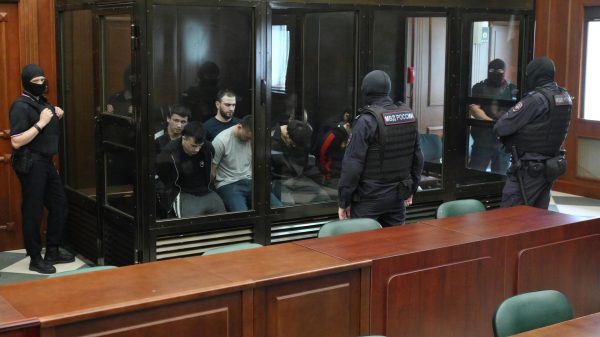What with one thing and another, 2020 hasn’t been a great 12 months. But the hardest year, perhaps, that many of us will have experienced has also brought some startling achievements, positive consequences and uplifting moments – a few flashes of light in the gloom.
Solidarity surges in time of Covid: humans, take a bow
2020 was undoubtedly the year when the volunteer society mobilised like never before. Record numbers of people responded to the sudden crisis in their local communities: delivering essential food, medicines and personal protective equipment; transporting patients to hospital; supporting testing and contact tracing; and providing social and psychological support to vulnerable and quarantined people.
According to the Red Cross and Red Crescent humanitarian aid organisations, 78,000 new volunteers signed up to help in the US; in Italy the figure was nearly 60,000. There were 48,000 in the Netherlands and 35,000 in Kenya. In Tuvalu, a country with no recorded cases of Covid-19, the local Red Cross welcomed 130 new volunteers. “In response to unprecedented humanitarian need, we have witnessed equally unprecedented humanity and kindness,” said Francesco Rocca, the president of the International Federation of Red Cross and Red Crescent Societies. “Though the future can seem bleak and the world divided because of this virus, every individual action of solidarity, of peace, of lending a hand and supporting your community counts.”
Female leaders really did do better
Countries led by women had “systematically and significantly better” Covid-19 outcomes during the first wave of the pandemic, locking down earlier and suffering half as many deaths on average as those led by men. An analysis of 194 countries by two academics, Supriya Garikipati, of Liverpool University, and Reading University’s Uma Kambhampati, suggested the difference “may be explained by the proactive and coordinated policy responses” adopted by female leaders such as Germany’s Angela Merkel, New Zealand’s Jacinda Ardern, Denmark’s Mette Frederiksen, Taiwan’s Tsai Ing-wen and Finland’s Sanna Marin.
Female-led countries handled coronavirus better, study suggests
Read more
The study examined policy responses and Covid-19 cases and deaths until 19 May, adjusting for variables such as GDP, total population, population density and proportion of elderly residents as well as annual health spending per head and level of gender equality. “When women-led countries are compared to countries similar to them along a range of characteristics, they have performed better, experiencing fewer cases as well as fewer deaths,” Garikipati said.
Science delivered with a promising new kind of vaccine
Conventional vaccines often take a decade or more to develop (a 1960s Merck mumps jab holds the record: four years); two coronavirus vaccines, both effective to about 95%, took just 300 days. Pfizer/BioNTech and Moderna designed a molecule called messenger RNA or mRNA which, injected into cells, instructs them to make the proteins usually found in the virus, stimulating an immune response from the body. Rollout has already started, and though vaccinating almost 8 billion people will be a medical challenge unparalleled in human history, the breakthrough has certainly raised hopes that 2021 will be a better year than its predecessor.
Although the technology had been in development for some years, mRNA vaccines had never before been licensed for use in humans. One big advantage is that they can be made fast: it’s a chemical process, with no need to grow proteins or viruses. But this also needs a whole new technology that, suitably refined, could change forever how medicine fights not just viruses but inherited diseases and maybe even cancer. These are early days, but the leap forward looks real and the signs are promising.
The Upside – sign up here for a weekly digest of pure optimism emailed to you every Friday
Read more
2020 was a record year for renewable energy
Global renewable electricity installation hit record levels in 2020 – unlike the fossil fuel sector, which was hit hard by the pandemic. According to the International Energy Agency, almost 90% of new electricity generation in 2020 was renewable, with just 10% powered by gas and coal. Solar power capacity has increased by 18 times since 2010 and wind power by four times, the agency said, predicting that green electricity could overtake coal to become the world’s largest power source by 2025. The IEA said growing acceptance of the need to tackle the climate crisis by cutting carbon emissions was making renewable energy increasingly attractive to investors. “Renewable power is defying the difficulties caused by the pandemic, showing robust growth while others fuels struggle,” said the IEA’s executive director, Fatih Birol.
Cities seized the chance to make more space for people and bikes
The pandemic acted as a catalyst for urban transformation, with authorities in many cities around the world seizing on spring lockdowns to reclaim the streets for pedestrians and cyclists. The Paris mayor, Anne Hidalgo, said it was “out of the question” to return to pre-Covid traffic and pollution levels, opening about 20 miles of new bike lanes, announcing plans for another 30, and sealing off a major east-west artery, the Rue de Rivoli, to private cars. Fourteen miles of new bike lanes appeared in Berlin, Athens and Dublin made major swathes of the city “car-unfriendly”, Milan turned 22 miles of street into cycle and footpaths, Rome approved 93 miles of temporary and permanent cycle routes, and cities from Brussels to Sydney and Bogotá to California took similar steps. Barcelona opened 18 miles of new cycle lanes and 7.5 of new pavement, eliminated 1,300 parking spaces and unveiled an ambitious 10-year plan to turn one in three streets in its central Eixample district into “green zones” with priority for pedestrians and cyclists.
Local politicians stepped up to the Covid challenge
They may have spent much of the year in survival mode, but that did not stop local politicians from across Europe coming up with innovative projects to save lives, protect jobs and make democracy more resilient. Among 400-odd entries from 22 countries in this year’s Innovation in Politics awards were a municipal farm supplying a school canteen in France; a British scheme allocating homeless people an address so they can apply for jobs and access healthcare with the addresses of long-vacant properties; a Dutch project using material from demolished high-rises to build modern homes; a free tax, legal and financial support advice service for struggling local businesses in Poland; and a Slovakian project that built a series of “quarantine towns” – fully-furnished shipping containers with free meals and healthcare visits – for homeless people who had tested positive for Covid-19, did not need hospital treatment, but had nowhere to self-isolate.
Fatherhood is reborn
In the UK at least, lockdown pushed British dads to undertake far more childcare than in the past, a small victory for gender equality advocates. In May, the Office for National Statistics found that the first Covid lockdown had led to a 58% increase in childcare undertaken by men, offering a tantalising prospect of a profound shift in caring responsibilities. “Research tells us that when there is a social movement happening, a crisis often accelerates the movement,” said Adrienne Burgess, joint chief executive of the Fatherhood Institute.
… and so are books
Admittedly it was a mixed picture from the publishing world, with physical book sales falling, but a record surge in the volume of ebooks sold in the UK. Fears of a collapse of independent book publishers did not materialise and many managed not just to survive but to thrive.
… and teaching
While the profession has been tested like never before in 2020, millions of teachers around the world demonstrated their resilience, flexibility, determination and ingenuity in keeping their young charges more or less on track despite unprecedented disruption. Teachers added a new digital string to their bow, with many reporting that their pedagogical skills had been rebooted by the crash course in remote instruction that the entire profession had to undergo in the first half of the year. Like many walks of life, teaching was upended by the pandemic, but will emerge stronger on the other side.
What were the other silver linings of 2020? Let us know at theupside@theguardian.com























































Свежие комментарии